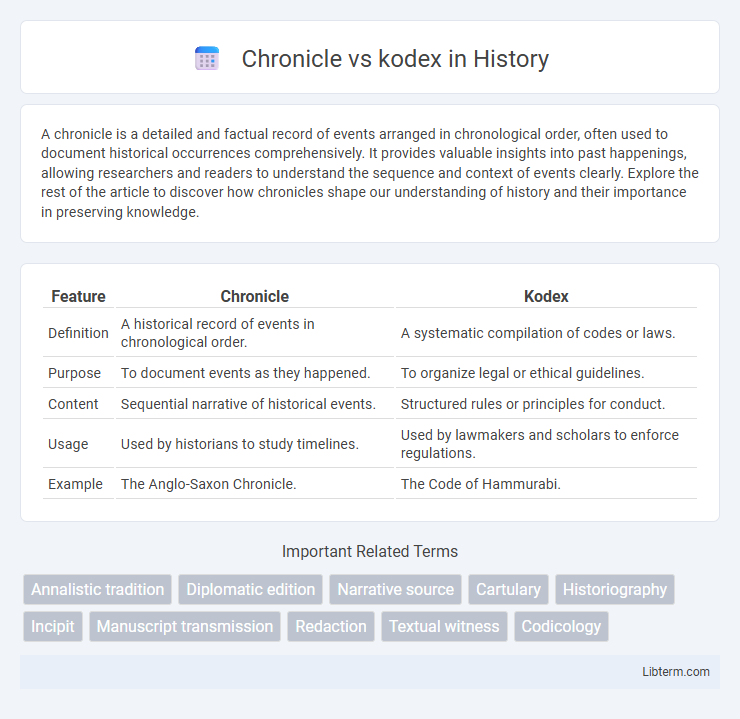A chronicle is a detailed and factual record of events arranged in chronological order, often used to document historical occurrences comprehensively. It provides valuable insights into past happenings, allowing researchers and readers to understand the sequence and context of events clearly. Explore the rest of the article to discover how chronicles shape our understanding of history and their importance in preserving knowledge.
Table of Comparison
| Feature | Chronicle | Kodex |
|---|---|---|
| Definition | A historical record of events in chronological order. | A systematic compilation of codes or laws. |
| Purpose | To document events as they happened. | To organize legal or ethical guidelines. |
| Content | Sequential narrative of historical events. | Structured rules or principles for conduct. |
| Usage | Used by historians to study timelines. | Used by lawmakers and scholars to enforce regulations. |
| Example | The Anglo-Saxon Chronicle. | The Code of Hammurabi. |
Introduction: Understanding Chronicle and Kodex
Chronicle is a security analytics platform that leverages advanced threat intelligence and machine learning to detect and respond to cyber threats efficiently. Kodex, on the other hand, is a code editor primarily designed for iOS, supporting multiple programming languages with a focus on usability and performance. Understanding the fundamental purposes of Chronicle as a cybersecurity tool and Kodex as a development environment highlights their distinct roles in technology ecosystems.
Defining Chronicle: Overview and Features
Chronicle by Google is a security analytics platform designed to help organizations detect, investigate, and respond to cyber threats more efficiently. It leverages massive data ingestion capabilities, advanced threat intelligence, and powerful search functionalities to offer real-time insights across complex security environments. Key features include automated threat detection, scalable data retention, and seamless integration with existing security tools for enhanced incident response.
What is Kodex? Key Functions and Capabilities
Kodex is a powerful data governance platform designed to streamline compliance management and ensure regulatory adherence across enterprises. It offers key functions such as automated policy enforcement, comprehensive audit trails, and real-time risk assessment to provide actionable insights for decision-makers. Kodex also supports integration with various data sources, enabling seamless data classification, monitoring, and protection within complex organizational environments.
Use Cases: When to Choose Chronicle
Chronicle excels in cybersecurity use cases that require advanced threat detection and continuous monitoring across complex enterprise environments. Enterprises seeking comprehensive threat intelligence integration and scalable cloud-native infrastructure often choose Chronicle for its robust analytics and real-time incident response capabilities. Organizations prioritizing seamless integration with Google Cloud services and extensive log management benefits find Chronicle the ideal solution for proactive security operations.
Use Cases: When to Opt for Kodex
Kodex is ideal for organizations requiring advanced data governance and compliance tracking in highly regulated industries such as finance and healthcare. Its robust audit logging and real-time security monitoring capabilities make it suitable for environments prioritizing incident response and detailed forensic analysis. Enterprises demanding granular access control and seamless integration with existing security frameworks opt for Kodex over Chronicle.
Comparative Analysis: Chronicle vs. Kodex
Chronicle and Kodex differ significantly in data integration and real-time threat detection capabilities, with Chronicle offering advanced security analytics through Google Cloud's infrastructure while Kodex provides customizable compliance solutions for diverse regulatory environments. Chronicle excels in scalability and automated incident response using machine learning, whereas Kodex emphasizes granular access control and policy enforcement. Both platforms support robust audit trails, but Chronicle's seamless integration with other Google tools gives it an edge in unified security management.
Security and Compliance Considerations
Chronicle offers advanced threat detection and incident response capabilities with a strong emphasis on real-time data analysis and scalable cloud-native architecture, enhancing organizational security posture. Kodex integrates robust compliance management tools designed to automate audit processes and maintain regulatory standards such as GDPR, HIPAA, and SOC 2, reducing compliance risks. Both platforms provide encryption and access control features, but Chronicle's focus lies in proactive security monitoring while Kodex emphasizes comprehensive compliance tracking and reporting.
Integration and Compatibility
Chronicle excels in seamless integration with Google's security ecosystem and supports a wide range of third-party tools through its open API, enhancing compatibility across diverse IT environments. Kodex offers robust integration capabilities specializing in cloud-native applications, providing native support for Kubernetes and Docker, which ensures high compatibility with modern containerized infrastructures. Both platforms emphasize interoperability, but Chronicle's extensive API support makes it a preferred choice for organizations with complex, multi-vendor cybersecurity ecosystems.
Pros and Cons: Chronicle vs. Kodex
Chronicle offers seamless integration with Google Cloud, advanced threat detection powered by machine learning, and scalable infrastructure ideal for enterprise environments. Kodex provides a highly customizable, open-source platform with strong community support, ideal for organizations seeking flexible and cost-effective security solutions. While Chronicle excels in automated analytics and cloud-native security, Kodex's main limitations include less polished user interface and potential complexity in setup, highlighting distinct suitability based on organizational needs.
Final Verdict: Which Solution Fits Your Needs?
Chronicle offers advanced threat detection and streamlined incident response with robust scalability for large enterprises, while Kodex excels in user-friendly interfaces and cost-effective solutions tailored to small and medium-sized businesses. The final verdict depends on organizational priorities: choose Chronicle for comprehensive security analytics and enterprise-grade performance, or opt for Kodex when ease of use and budget constraints are paramount. Evaluating specific needs such as integration capabilities, support, and long-term maintenance ensures selecting the optimal cybersecurity platform.
Chronicle Infographic

 libterm.com
libterm.com